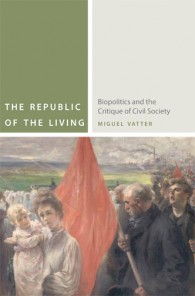In this new book published by Fordham University Press, Vatter takes up Foucault’s hypothesis that liberal “civil society,” far from being a sphere of natural freedoms, designates the social spaces where our biological lives come under new forms of control and are invested with new forms of biopower. In order to test this hypothesis, its chapters examine the critical theory of civil society—from Hegel and Marx through Lukacs, Adorno, Benjamin, and Arendt—from the new horizon opened up by Foucault’s turn to biopolitics and its reception in recent Italian theory. The book illustrates how natality can be thought of as a basis for a republican articulation of an affirmative biopolitics. It aims to renew the critical theory of civil society by pursuing the traces of natality as a “surplus of life” that resists the oppressive government of life found in the capitalist political economy, in the liberal system of rights, and in the bourgeois family. By contrast, natality offers the normative foundation for a new “republic of the living.” The result is a materialist, atheological conception of contemplative life as eternal life.
Miguel Vatter is Professor of Politics in the School of Social Sciences, UNSW Australia, and coordinator of biopolitica.org. He has a Ph.D. in Philosophy from the New School for Social Research, and has held academic positions in political science and philosophy departments in North America and Chile, as well as a visiting professorship in Germany. He works in the areas of political theory and contemporary philosophy.


